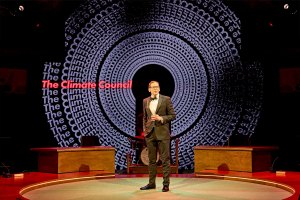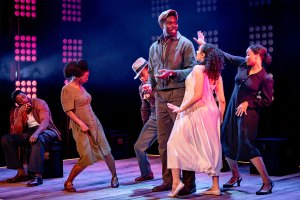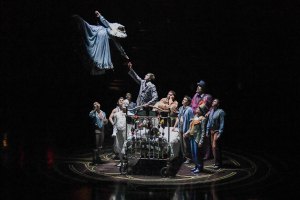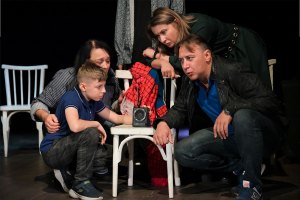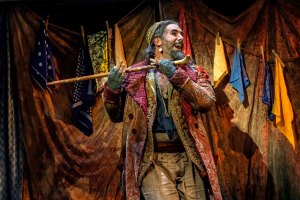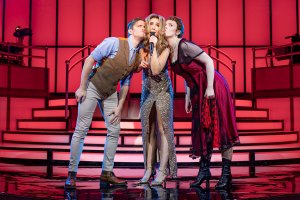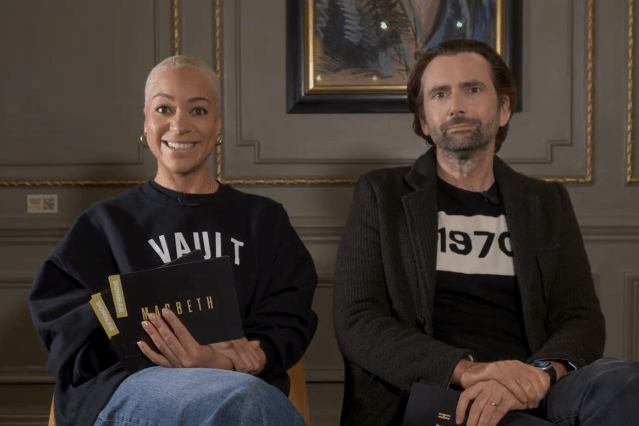Looking back: Michael Coveney's theatre highlights of 2013
The past 12 months has seen a rich array of blockbuster musicals, stellar play revivals and anniversary celebrations. Our chief critic casts his eye over some of the stand-outs.
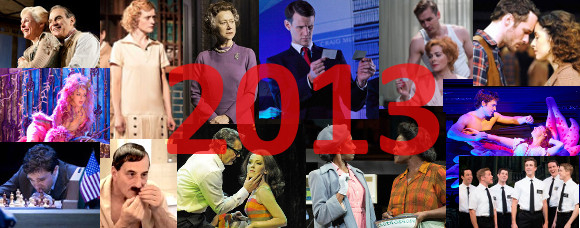
The almost unprecedented range and amount of outstanding productions in and the West End and at the National Theatre this year can be counted by the fact that so many eagerly anticipated highlights were opening in the very last month.
Jude Law topped off a great year for the new Michael Grandage Company at the Noël Coward with a deeply affecting and committed Henry V, a man boy flexing both his emotional and physical muscles in a foreign war.
Tom Hiddleston followed at the Donmar Warehouse as another sort of headstrong warrior, Coriolanus, sealing an impressive second year in charge for Josie Rourke, who gave film director Joe Wright his stage directing debut with a glorious backstage Victorian classic, Trelawny of the Wells, and brought in James Macdonald to direct Arnold Wesker’s Roots featuring Jessica Raine as the young country girl who finds her voice and individuality, and Linda Bassett, brilliantly hangdog, as her unimpressed mother.
Rupert Goold‘s staging of a new musical version of Brett Easton Ellis’s iconic 1980s novel American Psycho (in which greed is good and serial killing even better), starring the latest Doctor Who, Matt Smith, opened at the Almeida just one week ahead of the Profumo scandal musical, Stephen Ward, by the Sunset Boulevard team of Andrew Lloyd Webber, Don Black and Christopher Hampton.
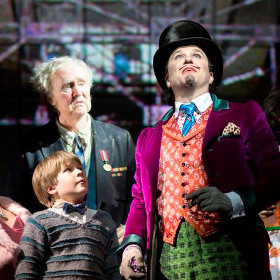
These were two “big ones” in a year of endless musical theatre adventure that included Sam Mendes‘s spectacular staging of Charlie and the Chocolate Factory, with designs by Mark Thompson, and a performance of genuine charm and bravura from Douglas Hodge as Willy Wonka; the much bally-hooed and efficiently staged satirical Broadway stunner, The Book of Mormon; and two movie re-hashes that insisted they were really returning to the original novel – The Commitments at the Palace and From Here to Eternity, part-produced by lyricist Tim Rice with a score by West End first-timer Stuart Brayson.
And then there was Once, the simple Irish folk/rock ballad musical about the precarious love affair between a Dublin busker and a Czech married mother that I enjoyed as much as any of them, if not more. Once, too, was based on a movie but couldn’t trade on it (because hardly anyone had heard of it) and was anyway a vast improvement. Unusually, a musical felt prompted by its own emotional content: the affair was set to music as we went along.
Quirky in a different, less satisfactory way, perhaps, was the Tori Amos musical at the National, The Light Princess, which was an engaging fairy-tale that seemed consumed by solving problems of its own devising. Still, it was a show that delighted and puzzled in equal parts, but there was no argument about the extraordinary performance of Rosalie Craig as the princess, defying gravity for well over two hours, acrobatically suspended and singing some demanding, often tricky, music the while.
Lyrics for The Light Princess were written by Samuel Adamson who provided, with trumpeter Alison Balsom, my absolute favourite show of the year: Gabriel at Shakespeare’s Globe, a London pageant telling stories of actors, singers, politicians and bargemen in the reign of Queen Mary to the accompaniment of the baroque, sublime music of our greatest English composer, Henry Purcell.
Jessie Buckley, probably the outstanding graduate of all the Andrew Lloyd Webber “search for a star” television shows (she was a Nancy also-ran) was marvellous in Gabriel as a lesbian soprano who disguised her sexuality, and she excelled again later as Princess Katharina in Jude Law‘s Henry V.
The National Theatre celebrated its 50th birthday with a gala performance (on 2 November) that was a masterpiece of planning and execution, another feather in the plumage of Nicholas Hytner whose successor as artistic director in 2015 will be Rufus Norris, an appointment universally applauded.
 Norris directed not only the opening production in the NT’s experimental new red Shed, Table by his wife Tanya Ronder, but also a revelatory and inspirational revival of James Baldwin’s The Amen Corner on the Olivier stage, in which Marianne Jean-Baptiste gave one of the great tragic performances of the year as a child of God who’s sacrificed her own family to his glory; the hot gospelling was to die for, thank the Lord.
Norris directed not only the opening production in the NT’s experimental new red Shed, Table by his wife Tanya Ronder, but also a revelatory and inspirational revival of James Baldwin’s The Amen Corner on the Olivier stage, in which Marianne Jean-Baptiste gave one of the great tragic performances of the year as a child of God who’s sacrificed her own family to his glory; the hot gospelling was to die for, thank the Lord.
Invidious, perhaps, to isolate a “black theatre” category but there was a quartet of great productions at the heart of our theatre year that defined one: The Amen Corner; Chiwetel Ejiofor returning on top form to the stage at the Young Vic in A Season in the Congo, a Shakespearean mock epic about the Belgian colonisation in Africa; Lenny Henry giving the performance of his short stage life (so far) as Troy Maxson in August Wilson’s Fences; and John Doyle‘s vibrant Menier Chocolate Factory staging of The Color Purple.
There was Adrian Lester, too, as Othello at the National, but he didn’t seem to nail the role as passionately as he had done (and will do again next year) as Ira Aldridge, “the African Roscius” in Red Velvet, and Rory Kinnear literally stole his thunder as well as his reputation as Iago. Hytner’s contemporary military outpost (Cyprus became either Iraq or Afghanistan) followed his fifth production of an Alan Bennett play, People, which riffed entertainingly around the serious problem of how to keep, manage or utilise our crumbling country manses, especially in the north of England.
Otherwise at the NT, John Heffernan and Kyle Soller were both superb in Joe Hill-Gibbins’ appropriately audacious production of Christopher Marlowe’s Edward II, and another NT debutant director, Simon Godwin, did a great job on Eugene O’Neill’s Strange Interlude, with a magnificent Anne-Marie Duff illuminating Eugene O’Neill’s novelistic drama from within.
Where was the RSC in all this? Not in London, or not so as you’d notice, until David Tennant‘s Richard II came storming into the Barbican from Stratford-upon-Avon at year’s end. Gregory Doran‘s production was superbly cast from top to bottom, and augured well for the future and the new three-year deal with the Barbican Centre. Back at HQ in Warwickshire, Jonathan Slinger was a wonderful, neurotic Hamlet and Michael Fentiman did a suitably barbarous Titus Andronicus with Stephen Boxer in the lead.
Vicky Featherstone launched her reign at the Royal Court with an open house for 140 writers, “surprise” Monday nights, a community soap opera in Peckham and a gimmicky-sounding food and philosophy event, Gastronauts, in the Theatre Upstairs (where Clement Freud once ran a restaurant); main stage business was confined to the disappointing anti-capitalist epic The Ritual Slaughter of George Mastromas by Matilda writer Dennis Kelly.
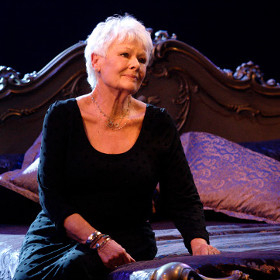
At least that play had the wonderful Tom Brooke in the lead, and his performance merited a mention in awards despatches, surely. The real “new play” action was elsewhere, with Lucy Kirkwood‘s compelling Chimerica at the Almeida (and, later, the Harold Pinter), sensationally designed by Es Devlin; the third play in Sean Holmes‘s provocative Secret Theatre season at the Lyric, Hammersmith, Caroline Bird’s riveting black comedy about chemicals and capital punishment, Chamber Piece; David Greig’s The Events for choir and massacre survivors at the Traverse and the Young Vic; and Conor McPherson‘s The Night Alive at the Donmar, a shockingly hilarious stage poem for a bunch of Dublin no-hopers with an astounding newcomer, Caoilfhionn Dunne, as a washed-up, waif-like refugee from domestic violence.
The West End had so-so revivals of Simon Gray’s Quartermaine’s Terms and Alan Ayckbourn’s Relatively Speaking, but there was nothing nostalgic or “yesteryear” about the brilliant revival of Jez Butterworth’s Mojo (though it was set in the1950s), directed by Ian Rickson, or terrific Toby Stephens and gorgeously bohemian Anna Chancellor in Private Lives, directed by Jonathan Kent. And Helen Mirren was simply amazing all over again as the Queen in The Audience, directed by Stephen Daldry, great designs by Bob Crowley; how did she do those onstage wig and costume changes, we’ve been asking all year?
I wasn’t mad about John Logan’s West End play, Peter and Alice, but the first half hour between Ben Whishaw and Judi Dench was worth the rest of the evening. The Michael Grandage season also included another so-so revival, A Midsummer Night’s Dream (the Globe’s with Michelle Terry as Hippolyta/Titania was much better, more bestial and funnier), and a superb one of Martin McDonagh’s The Cripple of Inishmaan with Daniel Radcliffe.
And just as Grandage established himself as the hot new producer on the West End block, along came his Donmar protégé, Jamie Lloyd, with a Trafalgar Transformed season scoring three absolute bull’s-eyes: James McAvoy’s mud-splattered, all-action Macbeth (almost as mud-splattered as Kenneth Branagh‘s in a deconsecrated church translated into a corrida-style dung pit at the Manchester International Festival); Simon Russell Beale and John Simm in a radically brilliant reappraisal of Harold Pinter’s The Hothouse; and a stunning re-staging of Alexi Kaye Campbell’s The Pride in which Hayley Attwell oscillated like Gilda in Coward’s Design for Living between Al Weaver and Harry Hadden-Paton.
Other notable events included The Sound of Music and To Kill A Mockingbird in Regent’s Park; Richard Eyre‘s symphonic production of his own version of Ghosts at the Almeida starring Lesley Manville (moving into the Trafalgar Studios for a season), and Kelly Hunter in Stephen Unwin’s Munch-inspired version of the same great play at the Rose in Kingston; a superb production of Brecht’s In the Jungle of Cities at the Arcola; Henry Goodman as Arturo Ui in another good Brecht ensemble effort; Roger Allam as the funniest and most exasperated Prospero ever at the Globe; Barry Humphries waving goodbye with Dame Edna’s gladdies at the Palladium; Chess and Billy at the Union; the Orange Tree‘s Middlemarch trilogy.
What were your highlights of the last 12 months in theatre? Let us know by voting in the 2014 WhatsOnStage Awards


